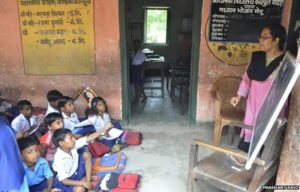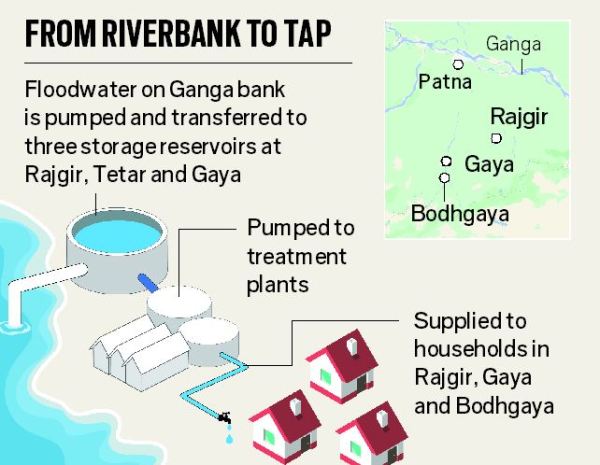The rot eating away at India’s primary education system
3 min read
When authorities in India’s Bihar state began a mass recruitment of primary school teachers in 2003, many believed it would lead to an improvement in the quality of education.
Bihar’s primary schools did not have enough teachers, so the new recruits were welcomed.
To fill in the hundreds of thousands of vacancies, the appointment rules were relaxed – the teachers were hired on presentation of degree certificates verified by the city or village council officials and they did not have to write any competitive examination.
Known as “contract teachers”, these new recruits are paid just 25% of a regular teacher’s salary of 40,000 rupees ($666; £389) a month.
More than a decade later, things look relatively better on paper – some 417,000 teachers, a majority of them (362,000) hired in the last decade, are employed with 73,000 primary schools.
But the reality is much grimmer: news washed up recently that more than 20,000 of the new recruits had forged their degree certificates to get their jobs. Authorities have already dismissed 779 teachers after investigation.
Senior education department official Ram Sharnagat told the BBC that they had received complaints against 52,000 teachers for submitting fake certificates.
“We will conduct a thorough probe and those who have forged their certificates will lose their jobs,” state Education Minister Brishen Patel said.
Rising corruption
This is not the first time that such a scandal has hit school education in Bihar: some 15,000 teachers were dismissed in December 2008 for providing forged certificates.
That’s not all. Education in Bihar is beset with several other problems too. Consider this:
- Over 60,000 primary schools are running without full-time principals.
- Last month, more than 50 principals in Kaimur district were suspended after they were found guilty of misappropriating funds meant for building classrooms.
- Last year, more than 10,000 primary school teachers were dismissed after they failed a mandatory competency test. These teachers failed to name the president of India and the planet closest to sun, among other things, in the test.
- In 2011, authorities detected two million “ghost” admissions in schools – students took admissions to more than one school to avail state benefits like free bicycles and uniforms.
- Some 2,800 primary schools in Bihar don’t have a single classroom, and 10% of the schools have only one classroom.
- In July last year, 23 primary students died after consuming contaminated free mid-day meals.
No wonder, say experts, Bihar has the lowest literacy rate in India – 63% against the country’s average of 74%. It also has a poor teacher-student ratio with one teacher for every 63 students, against the recommended national average of one teacher for 40 students.
Meanwhile, the contract teachers have threatened protest demonstrations if their dismissed colleagues are not reinstated. They say the government should have checked their degree certificates before hiring them.
Unpaid teachers
“How can you sack somebody after four to five years of service for submitting forged documents,” asks Puran Kumar, who heads an association of contract teachers.
Mr Kumar said 85,000 teachers had not been paid their salaries since March.
Educationists say authorities should hire teachers through rigorous examinations, and not by looking at their certificates alone.
“Teachers must be appointed after much scrutiny of their educational qualification and talent,” says Srikant, director of the Jagjivan Ram Institute for Social Research and Parliamentary Studies.
“In a state like Bihar anyone can get a degree certificate by paying bribes to colleges and universities.”
No wonder then that a primary school teacher in Samastipur district was caught on camera by a local news channel a few years ago telling students that there were 360 days in a year and that Patna – the capital of Bihar – was the Indian capital.
She also spelt January as Junuary, apple as Apil, and education as adukesun.
Courtesy: BBC



